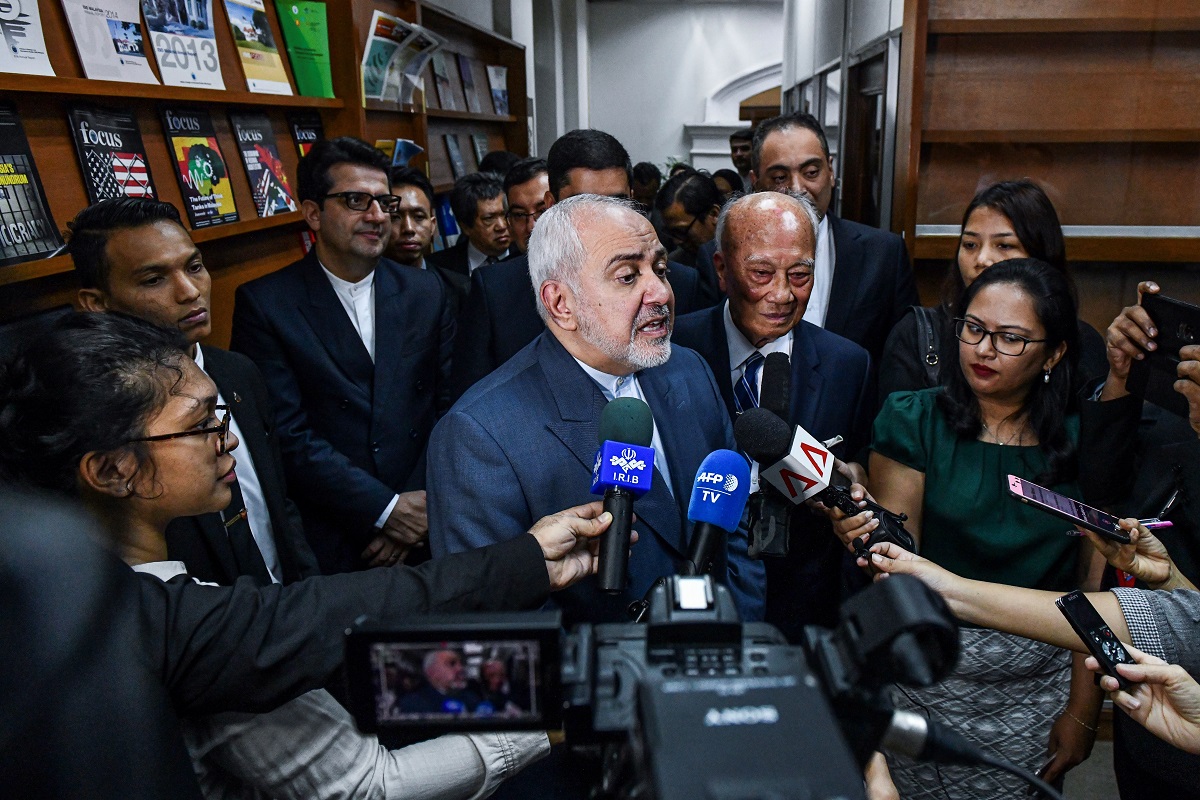Elon Musk calls for peace in cryptic post amid Iran-Israel war
His comments come amid recent attacks on Israel by Iran, reportedly in retaliation to the attack on their embassy.
Unlikely once more, given the overriding influence of the supreme leader, Ayatollah Khamenei.

Iran's Foreign Minister Mohammad Javad Zarif (C) speaks to members of the media after the Islamic World Forum in Kuala Lumpur on August 29, 2019. (Mohd RASFAN / AFP)
As sanctions pile on sanctions, fairly resounding wasTuesday’s rebuff from Tehran to Washington. Iran’s President has let it be known that he is loath to hold talks with Donald Trump, unless the US President first lifts the crippling sanctions imposed on Tehran. Unlikely. And then the supplementary with tongue firmly in cheek ~ “Otherwise a meeting between the two would be a mere photo op.
If someone intends to make it as just a photo op with Rouhani, that is not possible.” The Iranian President is right; a meeting between the two Heads of State must of necessity be substantive, leading to a marked relaxation, if not withdrawal of sanctions quite yet. While this is expected of the United States of America, the western world in particular will in parallel expect the moderate Rouhani to curb Iran’s nuclear proliferation. Unlikely once more, given the overriding influence of the supreme leader, Ayatollah Khamenei.
The deadlock, therefore, might persist for some time yet. Mr Rouhani has spelt out his stance a day after Trump said there was a “really good chance” the two could meet after a surprise intervention by the French President, Emmanuel Macron, during the G7 summit to try to bring Washington and Tehran together. No less surprising was the visit of the Iranian foreign minister, Mohammad Javad Zarif, to Biarritz, one that was opposed by the hardliners in Tehran. Twenty-four hours before Iran made the talks conditional, President Rouhani had expressed his readiness to negotiate a way out of the crisis following America’s pullout from the nuclear deal.
Advertisement
That pullout, despite the fact that the West had acknowledged Iran has abided by the 2015 deal, has over the past four years made confusion worse confounded. Under the deal, Iran agreed to limit its enrichment of uranium in exchange for the lifting of economic sanctions. Post- Biarritz, the contentious issue of Tehran’s nuclear proliferation appears to have become still more intractable. The US President’s hope of negotiations in parallel with President Macron’s anxiety to play the honest broker has hit the reefs. Critically enough, France has over the past few weeks emerged as a factor in matters nuclear between the US and Iran.
On Tuesday, Macron acknowledged his efforts to bring Iran and the US together are “fragile”, but said he still sees a “possible path” towards rapprochement between the two. Inviting Zarif to the G7 summit as a surprise guest was a risky diplomatic manoeuvre but it helped create “the possible conditions of a useful meeting,” Macron said. The hope of such a meeting has now effectively been binned by Iran though President Macron has acknowledged that it is France’s responsibility to play the “role of a balancing power, and that his efforts allowed hope for a “de-escalation” of tensions. Rouhani’s U-turn can be seen as a result of pressure from hardliners in the establishment.
Advertisement